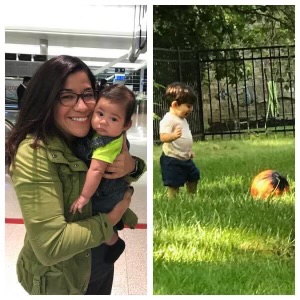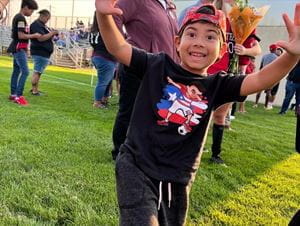When Hurricane Maria hit, I was in shock. Many of us Puerto Ricans who have left the island recognize the feeling of not being there for and with our family and friends. You may leave the island, but the island doesn’t leave you. There is a song that every Puerto Rican knows and the most important line is “Yo sería borincano aunque naciera en la luna.” I’d be Puerto Rican even if I was born on the moon. A statement I remind my girls about.
'cause as someone tells me
they say that the moon is one
be it over the sea or be it on the mountain
and so I'm yelling to the villain:
I'd be borincano
Even if I were born on the moon.
You see our pride; it is not only displayed through our flag. My family and friends held me high, made me believe. And why would a climate phenomenon take that away from me? On Day 6, I received a text. I can still picture it. “Estamos vivos.” We are alive.
I heard nothing else for another day until the phone rang and I said hello. My brother simply said, “Get us out of here.” He has always been a direct man. He was born when I was a senior in high school, and to this day, is spoiled as our baby. I said okay, and asked for Mom. She simply said, “God bless you.” A custom for us, is to always ask for the blessing of our elders: La bendición, I requested.
The conditions? I can say a lot about how bad they were. But this should give you the idea: my brother had a three-month -old, Diego, his first, and they were mixing formula with rainwater. My mom, who has plenty of chronic conditions, was taking only two of her seven medications, and taking them every other day so they would last until she made it stateside.
I looked for private charters to the States, but it was impossible, and so three weeks later, in misery, they finally made it.
 Diego is now a kindergartner in Indianapolis, and I still have his family here with me. I am blessed that my mom is also here in Indianapolis. (Although, to be fair, as soon as it gets cold she will curse Indiana and beg for the next flight home.) The trauma of experiencing Hurricane Maria was not just for those who remain on the island. The trauma is still in the hearts of the diaspora.
Diego is now a kindergartner in Indianapolis, and I still have his family here with me. I am blessed that my mom is also here in Indianapolis. (Although, to be fair, as soon as it gets cold she will curse Indiana and beg for the next flight home.) The trauma of experiencing Hurricane Maria was not just for those who remain on the island. The trauma is still in the hearts of the diaspora. Here we are again, and here we will be in the future.
After Maria, I was blessed with this community, with friends all over the country, with my neighbors who helped us with donations for Puerto Rico and who welcomed my family who brought no clothes, and certainly no winter jackets. When Diego started kindergarten in August, I sent a message to all of them saying, here he is. Because of all of you.

Today, in Hurricane Fiona’s wake, many in Puerto Rico are without power, without water. The true extent of the damage is not yet known, but we do know that the suffering is immense.
The Department of Medicine has formed relationships with the four medical schools in Puerto Rico. I have checked in with all of them. Please note that on October 4-6, our department will be hosting mock interviews with students from Puerto Rican medical schools to help them prepare to interview for residency spots in the United States.
Last year, there was a class of physicians from Puerto Rico who had endured Hurricane Maria, earthquakes AND the COVID pandemic. I hope no one has questioned their resiliency, or their worthiness of our program.
Ponce Health Sciences University has set up a donation site to assist those impacted by Hurricane Fiona. If you can help, visit prirelief.org.
I hope this was not too personal; my department is my familia of colleagues.
